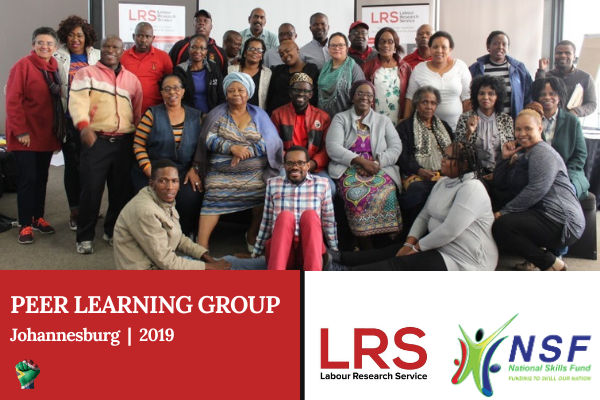From May 21 to 24, 2019, the Labour Research Service (LRS) hosted its inaugural peer learning workshop as part of a broader initiative for addressing information and skills imbalances in collective bargaining in trade unions. Supported by the National Skills Fund, this project aims to equip worker representatives with strategies for negotiating in a changing world of work.
The participants are experienced worker leaders, ranging from one to ten years in their roles, representing various sectors at plant, provincial, and national levels, from formal and informal sectors, including:
- South African Transport Workers Union (SATAWU)
- South African Catering Commercial Allied Workers Union (SACCAWU)
- South African Democratic Teachers’ Union (SADTU)
Health and Other Services Personnel of South Africa (HOSPERSA) - South African Domestic Services and Allied Workers Union (SADSAWU)
- United Domestic Workers of South Africa (UDWOSA)
- South African Municipal Workers’ Union (SAMWU)
- African Reclaimers Organisation (ARO)
- Migrant Workers’ Union of South Africa (MIWUSA)
- Johannesburg Informal Traders Platform (JITP).
Defining an Inclusive Collective Bargaining Agreement (ICBA)
Participants explored the components of a collective agreement that addresses the needs of all workers in a workplace. Key questions explored included: What is my position relative to a more inclusive collective agreement? What gaps currently exist? What are the priority issues? How can we address these priorities?
Participants explored the components of a collective agreement that addresses the needs of all workers in a workplace. Key questions explored included: What is my position relative to a more inclusive collective agreement? What gaps currently exist? What are the priority issues? How can we address these priorities?
Goals
- Worker leaders who are more confident in including the needs of traditionally overlooked workers in the collective bargaining agenda.
- Worker leaders who can better identify and address issues relevant to the changing nature of work in their bargaining strategies.
- Real-world examples of current collective bargaining challenges that can inform future strategies and be featured in the new LRS Trade Union Manual for Negotiators.
An inclusive collective agreement addresses the evolving workplace and commits to meeting the diverse needs and conditions of every worker.
A day in the life of a worker
The participants formed groups and mapped out a day in the life of workers in their sectors. Group A included healthcare workers, care workers, waste pickers, and live-in domestic workers. Group B consisted of teachers, commuting domestic workers, informal traders, and contract cleaners. Group C comprised petrol attendants, security workers, and hospitality sector workers, both vulnerable and formally employed. Creating the personas revealed common and sector-specific issues faced by workers.
The Collective Bargaining Agreement
A collective agreement means a written agreement concerning terms and conditions of employment or any other matter of mutual interest concluded by one or more registered trade unions on the one hand and the other hand: One or more employers, one or more registered employers’ organisations, or one or more employers and one or more registered employers’ organisation.
Labour Relations Act (Section 213)
Participants examined different types of agreements, including Sectoral Determinations, Private Sector Bargaining Councils, Public Sector Bargaining Councils, and Plant/Institutional Level agreements. They discussed their experiences and what it means to bargain within these frameworks.
Collective bargaining amplifies workers’ voices and improves their working conditions. It aims to balance the unequal relations between employers and full-time employees. However, the prevalence of temporary, part-time, and other contractual arrangements, such as those involving labor brokers, means not everyone has achieved adequate conditions at work.
Participants identified key issues that should be included in any decent agreement:
- Above-inflation salary increases
- Paid overtime
- Night shift allowances
- Annual bonuses
- Paid study leave
- Provident funds
- Medical aid
- Compensation for workplace injuries and deaths
- Guaranteed maternity leave
- Family responsibility leave
- Childcare provisions for overtime or travel
- Decent working hours
- Safe working conditions
- Specific and enforceable collective agreements
- Agreements that enforce all labor laws and are binding to all parties
Towards a model Inclusive Collective Bargaining Agreement (ICBA)
What’s missing in the existing agreements, and how can we address these gaps? Worker leaders have identified several priorities to strengthen their collective bargaining agreements.
Migrant domestic workers (Live-in)
Priorities:
1. Annual bus ticket
2. Quick implementation of agreements and enforcement of labor laws, including the National Minimum Wage Act
3. Union access to employer’s property
4. Addressing violence and discrimination at work
Strategy: Empower members to bargain independently and provide support such as drafting official communications.
Domestic workers (Live-in)
Priorities:
1. Written contract of employment
2. Pension or provident fund
3. Mechanism to report inefficient labor inspectors
4. Housing for retired domestic workers
Community health workers (Care Workers)
Priorities:
1. Absorption into the Public Service Sector
2. Extension of the one-year resolution, which ended in June 2019
3. Occupational health and safety standards
4. Skills development and training
Contract cleaning workers
Priorities:
1. Establishing a bargaining council for the contract cleaning sector
2. Adjustments to early reporting and late knock-off times
3. Increased compassionate leave beyond the stipulated three days
4. Medical aid and housing allowance
5. Addressing concerns about national-level bargaining through the proposed contract cleaning bargaining council
Strategy: Conduct a union membership recruitment drive to meet the required numbers for setting up the bargaining council.
Wholesale and retail workers
Priorities:
1. Night shift allowances, compensation calculations, and conditions of service
2. Family responsibility leave of at least 12 days
3. Study leave and loans
4. Maternity leave of 12 months, with eight months paid by the employer and four by the government
5. Minimum entry-level wage of R5000 per month
6. Simplified proof requirements for family responsibility leave
Retail sector – Part-time workers
Priorities:
1. Compulsory medical aid
2. Safe and reliable transport for early and night shift workers
Strategy: Implement recruiting and organising drives by the trade union.
Informal traders
Priorities:
1. Provision of storage facilities
2. Childcare facilities or daycare centres
Waste pickers and recyclers
Priorities:
1. Safety for female waste pickers working early hours
2. Licensing of cooperatives to ensure member benefits
3. Information on the recycling sector, including operators and waste volumes
4. Access to membership cards
5. Recognition of associations at regional and local levels
6. Popularizing membership requirements
7. Provision of ablution and storage facilities
8. Access to secured properties
Petrol attendants
Priorities:
1. Transport to work on time
2. A living wage, including a 13th cheque
3. Night shift allowances
4. Equal benefits and conditions for casual and full-time workers
Security workers
Priorities:
1. Implementation and popularisation of the bargaining council for the security sector
2. Wages, including a 13th cheque
3. Night shift allowances
4. Shorter working hours
5. Transport
6. Improved working stations
Education sector
Priority:
1. Enforcing and popularising the new collective agreement (Number 3 of 2018) on compulsory inquiry by arbitration concerning sexual misconduct by teachers on learners.
View workshop photographs on our Facebook page here and here.
- Peer Learning 2 Workshop – Bargaining strategies in precarious forms of work
- The Negotiator’s Guide – A guide to negotiating in a changing workplace








